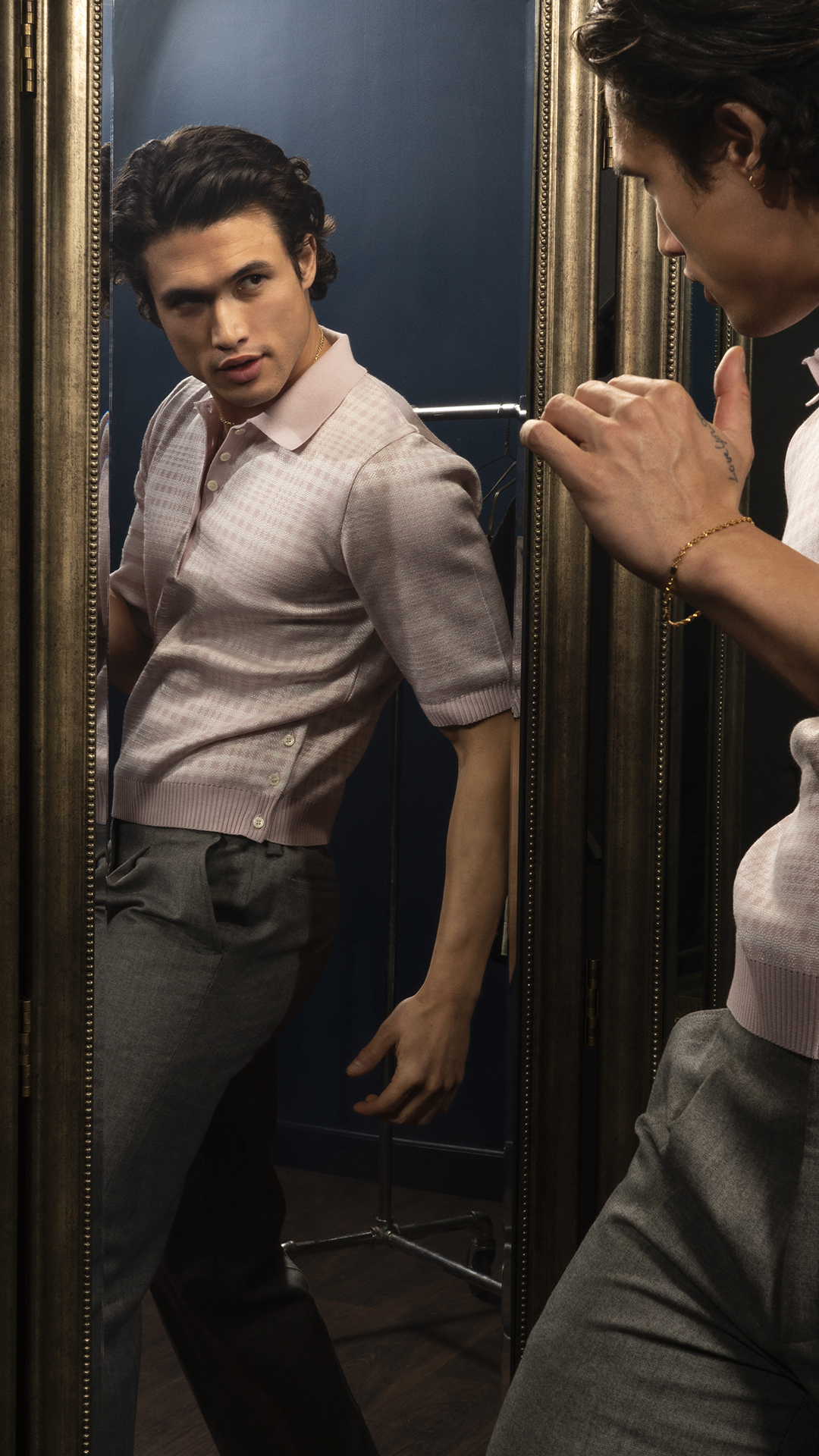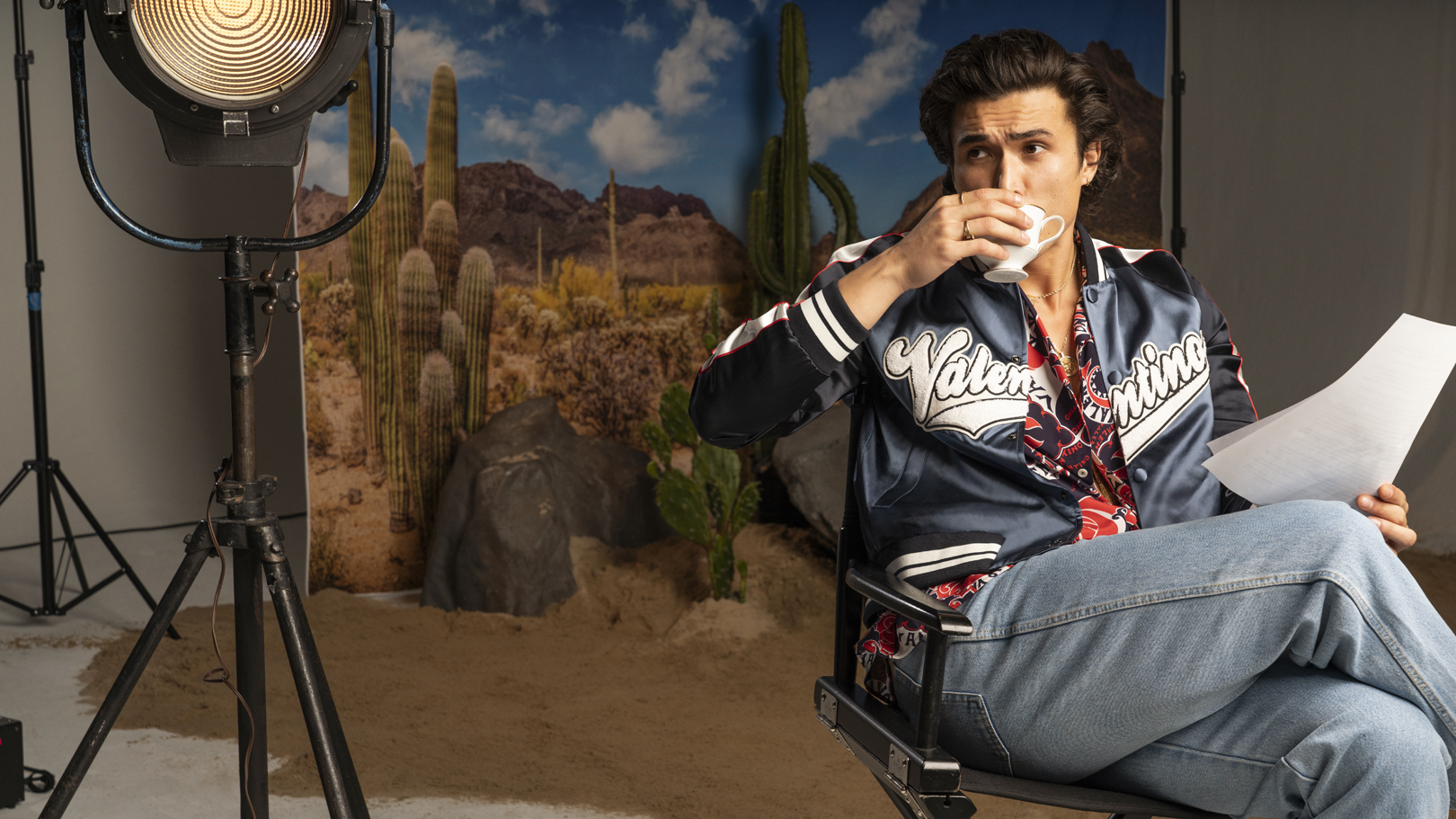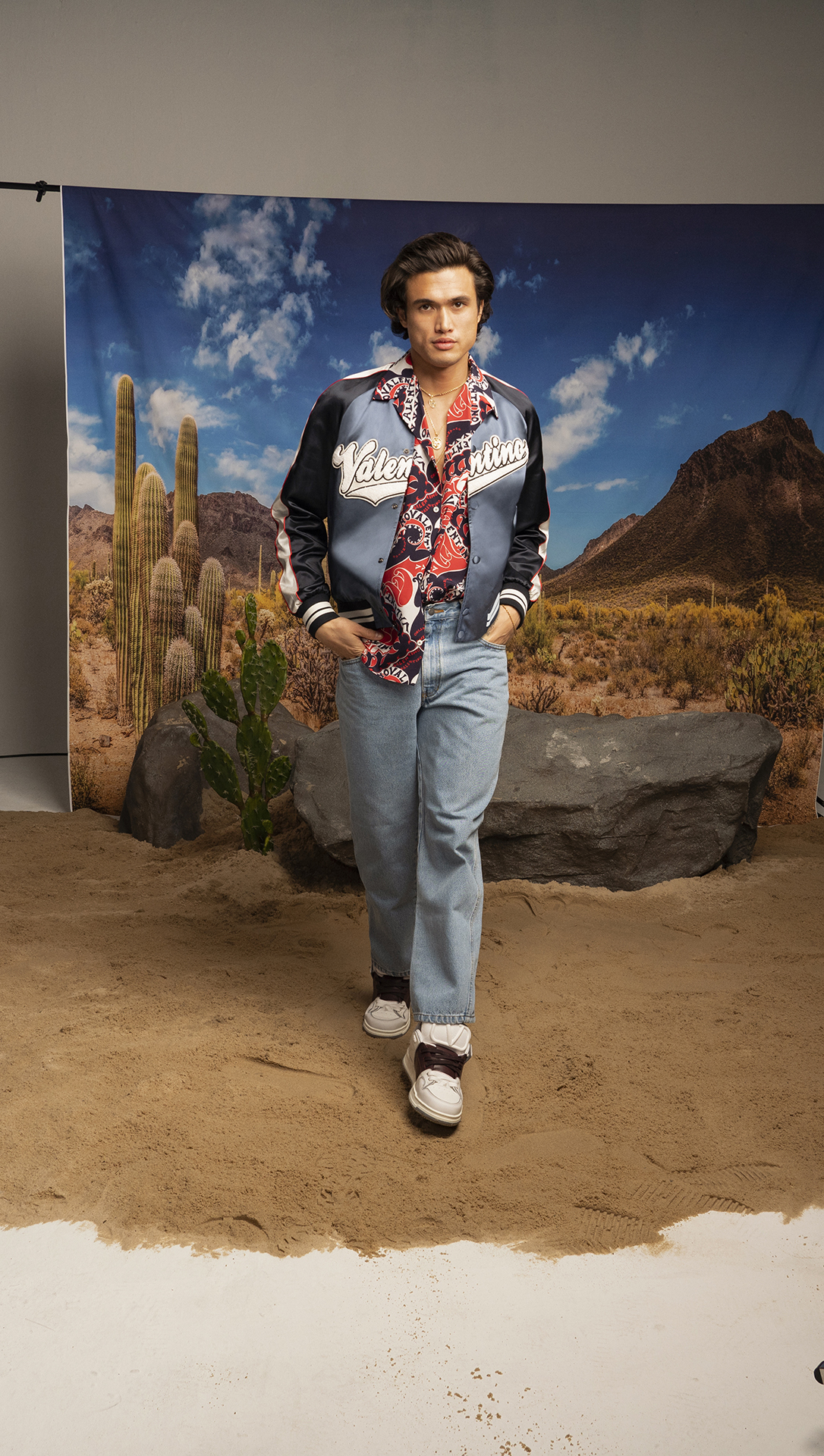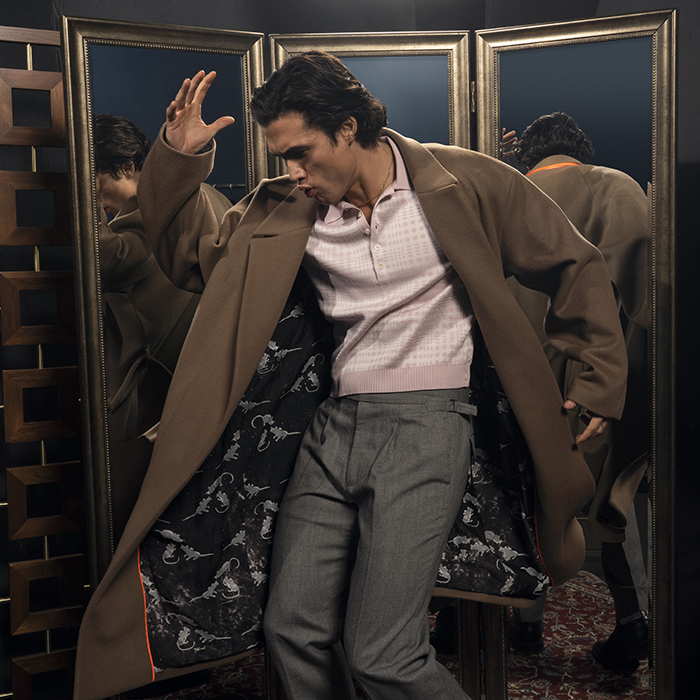
Charles Melton knows that being a leading man in 2022 is about more than just being first on the call sheet or the biggest face on the poster. It’s about leading by example and cultivating a safe atmosphere on set. Gone are the days of demanding behavior by Hollywood’s biggest stars going unchecked, and that’s something the 31-year-old actor welcomes with open arms.
When he arrived at Be Electric Studios in Bushwick, Brooklyn, for the cover shoot for his May digital cover for In The Know, Melton greeted everyone who crossed his path with a welcoming smile, expressing excitement about the long day ahead. His infectious positivity and down-for-anything attitude had a tangible effect on the set, where he channeled leading men from eras past.

Perhaps it’s an approach to work he picked up on the set of Riverdale, the CW show on which he has played Reggie Mantle for five seasons now that is also known for its grueling filming schedule. While many stars grow to loathe the shows that made them famous after they continue on for a bit too long, Melton still views his career-altering role with gratitude and humility. If he’s itching for a change, he doesn’t make it too obvious.
For our May 2022 digital cover story, In The Know’s Gibson Johns sat down with Melton on the set of his cover shoot to discuss his approach to stardom and whose careers he strives to emulate, being considered a heartthrob, how to improve AAPI representation in Hollywood and what he hopes to do after he closes the chapter on Riverdale.




































Gibson Johns: Charles Melton, we’re here on the set of the cover shoot for your May digital cover for In The Know, and you’re channeling classic Hollywood leading men. What does it mean to be a leading man in 2022?
Charles Melton: I think to be a leading man in 2022, you have to lead by example. It's a lot about coming to work every day and to just be a positive energy and to be kind to everybody that you meet. [It’s also about] taking charge, leading by example, being a little humble, being decisive, going with your instincts and not so much being a diva.
Gibson: That's [behavior that would’ve been tolerated in] the past.
Charles: Yeah, that's in the past. That's the ’70s, the ’80s. That's not cool [now]. It's just being kind and getting to know everybody and just doing your work. It’s putting the project first and the people first, because it takes a team to get a whole project together. It's not all about you.
Gibson: You're a fellow ’90s baby, and I’m wondering if there were any other leading men growing up that you looked to that you were like, “Oh, I want to be like him”?
Charles: There are a lot. I mean, where do I begin? I really loved Tom Hanks. He did some great films [and he was known for] leading by example. You always hear about his kindness. On set, people are always impacted by the kind of experience they have, and it’s the same thing with what I've heard about Bill Murray. I’ve heard that he would go to restaurants and come up to you and take a french fry off your plate, and take a bite and say, “No one's gonna believe you.” I really enjoy Keanu Reeves — he’s great. You hear so much about his kindness, especially with what he did with The Matrix, in donating a lot of the money that he received to the cast and the crew.
Gibson: You clearly are thinking about the fact that it's more than just your face on a movie poster. It’s also about your reputation and how people think about you on set.
Charles: Oh, for sure. It goes beyond just your performance or what people see. It’s [also about] what’s behind that character or that mask of that movie or whatever you're doing. I think it goes a long way, how you carry yourself on set and the kind of influence that you bring with you. Sometimes you have to put aside some personal things to get the ship moving and running.




Gibson: Has that been a learning curve for you? Because I feel like probably when you're first starting out in Hollywood, you think about some of these things one way, and then the reality of it ends up being completely different.
Charles: I forget who told me this — I think this was my dad or something — not to get too deep or anything, but just because you suffer doesn't mean you have to make other people suffer too. Just because you're having a bad day doesn't mean everyone else has to have a bad day.
Gibson: This is for In The Know’s May cover story, and May is also Asian American and Pacific Islander Heritage Month. While representation has improved in recent years, there still aren't that many Asian actors who are considered leading men in Hollywood. As the first Asian actor to lead a teen romance movie for a major Hollywood studio, what do you think still needs to improve to increase presentation? What do you see as some of those blockers?
Charles: I think we're all moving in the right direction. A lot of doors are opening, and I think it's very interesting. Growing up I really never saw too many people like me on screen, right? And I'm half [Asian] as well, and I kind of always dealt with the identity thing about, “Am I Asian enough? Am I white enough? Am I enough?” I just think it's great, everything that's happening with TV and film right now — with creative [improving] from all sides. Behind the camera, in front of the camera, writing, directing, producing, and I think that's great. We're creating our own things.
Gibson: You're on a show that has a lot of young viewers, and you talked about not seeing people when you were growing up who looked like you, necessarily. Do you think about your being that for young people who are watching you onscreen?
Charles: I was in Atlanta, Georgia, and I was filming a movie there. It was 6 o'clock in the morning. I was really tired, and this guy who's about my father's age came up to me at [airport security] and he was like, “Hey, you play Reggie on Riverdale, right?” I’m like, “Yeah.” He's like, “Charles, right?” I was like, “Yeah.” He was like, “I'm a huge fan.” I was like, “That's awesome.” And usually guys that age say, like, “My wife's a huge fan. Can we get a picture?” But he said he was a huge fan, and then we got through security and he introduced me to his wife, who was Chinese, and then his son. His son was nine years old. His wife leaned over to his son and was like, “See, he's a movie star! And he's Asian. Just like you. You like him? He looks like you.” I thought that was a cool moment. I'm never gonna forget that.
Gibson: Growing up, you moved around a lot as a kid — Alaska, Korea, Kansas — those were all home for you. How do you think that moving around a lot like that contributed to who you are or to your identity?
Charles: I think it's made me who I am today. The one thing that was consistent traveling all those years was family for me, because I always had my family by my side. We were all over the world. Have you ever heard of the term third culture? It’s [about] living between third cultures in my home, and being a part of a different culture outside of the U.S. on U.S. military bases all over [and that] really, really shaped me.


Gibson: That must’ve also gotten you to be good at coming into a set like today and your having to be the person who's saying hi to everyone. You're clearly good at making friends!
Charles: I do do that. I always feel comfortable when I introduce myself, and I want people to feel comfortable. It’s just a good thing to do. Like, why not? We come here for a day, right? And hopefully we get to see each other again, but we may not see each other ever again. So, why not? Let's just have fun for the next 10 hours. I like doing that.
Gibson: So, you’re Reggie on Riverdale, which is going on seven seasons now. It's obviously been a boon for your career, and it’s done wonders for you. But I know that being on a TV show for a long time can be taxing. Your co-star Cole Sprouse said recently that the cast is eager to tie the bow around the show and then move on. Where do you stand mentally with Riverdale and your role as Reggie?
Charles: Well, first off, I'm grateful. The show's done so much for me. We have been on the show for six years and … you know that term that people always say, the grass is always greener? I think in any circumstance, you can say that. Being an actor and doing different projects is kind of like a diary, in a way, but this entry has been six years. It's fantastic. It's been amazing. [Next will come] a different diary with a new entry, but every chapter has to go into it. But I'm still excited about this one. I'm still writing about it.
Gibson: Something that usually comes along with being a leading man is being a heartthrob. It’s part of what comes with that territory. How do you think about that? You're no stranger to a shirtless picture now and then, and there's clearly some playfulness there — and people like to see that. Do you embrace that role of being that someone people can ogle a little bit? Do you lean into that?
Charles: Yeah. I mean, I don't think I'm embracing it to the point where I'm putting it at the forefront of everything. But, yeah, sure. I don't want to lie and say it's not exciting, but I don't know. I'm still just me, mentally. I'm still the kid wearing headgear and braces and cargo shorts to school every day at, like, 10 years old.
Gibson: Classically, there's also an interest in the personal life of actors on a teen-centric show, which there is with you, and I'm curious how you are able to keep that separate from your professional life? You do a pretty good job of that, and it’s clearly important to you to do so.
Charles: You want to keep those separate, right? Sometimes I can get so caught up in what I do or who I am, but what I do is not who I am, you know what I'm saying? So, doing things like connecting with my family, seeing my family, friends or just checking out a bit and turning off the phone [help with that]. By putting myself in a circumstance where I have no service [is important], because I can't really turn off my phone. I gotta have my phone, so I just gotta go into the middle of nowhere. I have no service, so I have no choice.
Gibson: So, at some point Riverdale is going to come to an end, and your schedule will become a little less grueling. When you think about life beyond Riverdale and you have all that free time back in your life, what kind of roles are you going to be looking for? What kind of projects do you want to be doing?
Charles: That's a great question. I think it's gonna be bittersweet, but I just want to do things. I want to work with great filmmakers, writers, things that allow me to learn from the characters and the stories they’re telling. Things I’m passionate about and excited about. Dark is fun, villainous is fun, but I also look for hopeful kinds of stories. I think there's some sort of hope in every story, no matter how dark you get, and that's exciting. There are a couple of things that I’m already excited about.













